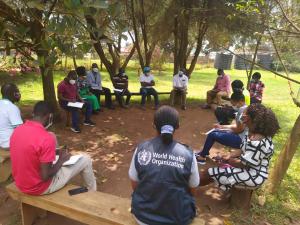WHO leads Partner coordination and Collaboration in the fight against COVID-19 in the Acholi sub region, Northern Uganda.
A Regional Partners’ Consultative Forum established by WHO in Gulu district, Northern Uganda has strengthened partner coordination, increased resource mobilization, and created synergies for an effective COVID-19 response.
The coordination has helped to harmonize response activities, foster accountability, and transparency. With WHO technical coordination and guidance, there is now less fragmentation and duplication of response activities.
The COVID-19 Partners’ Consultative Forum for the sub-region is composed of more than 50 members, each representing a different organization, government department, private sector, civil society, organization, and other stakeholders.
“Building effective partnerships has led to improved resource mapping and mobilization from the respective partners, which has helped to meet the demands of the affected persons, communities, and institutions for an impactful response," says Margaret Nanyonga, a WHO staff based in Gulu City.
She cites the case of Soleterre Foundation, that realized through the forum, the urgent need for COVID-19 supplies at Gulu Hospital and other lower-level health facilities. Consequently, the foundation provided medical supplies including pulse-oximeters, Personal Protective Equipment, hand washing facilities, thermometers, face shields and gloves.
Similarly, interventions by other forum member organizations have contributed to the enhancement of health workers’ capacity in home-based care, mental health, psycho-social support, and risk communication. With these interventions, the sub-region has been enabled to identify and address potential opportunities and challenges for an impactful response.
Mr Adrian Saali, the Soleterre Foundation Representative in Uganda, delightfully notes that “WHO coordination has been very instrumental and responsive towards our framework. We have been able to achieve much using the available little resources.”
To enhance community engagement and sensitization, WHO and the Ministry of Health worked with the Terra Renaissance to mount a mass sensitization campaign in markets, banks, private hospitals through direct interaction, mobilization of people for action and distribution of printed materials to increase knowledge and preventive skills about COVID-19 were undertaken.
Other risk communication interventions have been boosted with support from the United Nations Children’s Fund, a member organization in the coordination forum.
In addition, Terra Renaissance supplied 30,000 masks and other medical supplies to those most in need and to under-resourced health facilities.
“Working closely with WHO and other partners, we were able to offer concerted efforts in drawing up integrated plans and implementing activities to support the fight against the COVID-19 pandemic,” says Mr Jimmy Otema, the Head of the Regional Sub Office, Terra Renaissance.
In the COVID-19 response in Uganda, alert management desks have been very instrumental in conveying alerts of suspected cases to the teams. As such, support from WHO through AMREF enabled the establishment of alert management desks in eight districts in the Acholi sub-region.
“Coordination of surveillance activities for the COVID-19 pandemic in addition to notifiable diseases in the 8 districts remains a big challenge. But with the guidance of the WHO field team, partners have been mobilized to support this important area of work,” says Dr Janan Bishop Loum, the Sub-region Surveillance Focal Person who also chairs the Gulu Regional Referral Hospital COVID-19 task force.
Due to the nation-wide lockdown, increased incidents of domestic violence were registered. In that regard, partners such as CARE-International stepped in to support awareness creation through the integration of COVID-19 messages with Gender-Based Violence community dialogues. In addition, Information, Education and Communication materials have also been distributed to enhance the message.
“Partner coordination and engagement under COVID-19 control has contributed enormously to the health system strengthening and I commend the WHO team for spearheading the coordination and resource mobilization for the effective management of the response,” says Mr Idiba Yoweri, District Health Officer of Gulu District.
With a well-coordinated partners’ forum in the sub-region, the mobilized resources have bridged the gaps identified during the planning and coordination meetings from the beginning of the response. All partners have embraced the integrated model of the COVID-19 response in their programs, a key determinant of collaborative success.
Since cooperation, effective coordination and good partner relationships lead to tangible results, organizations in the forum are more willing to invest more in public health. Indeed, coordination and cooperation are contributing to increased field effectiveness and satisfaction for the beneficiary communities.
Health Promotion Advisor
Tel. : +256 414 335505
Cell: +256 772 507906
Email: sensasib [at] who.int (sensasib[at]who[dot]int)
Public Information Officer
Tel. : +256 313 335569
Cell: +256 786 497073
Email: mwebembezie [at] who.int (mwebembezie[at]who[dot]int)



